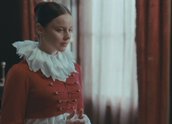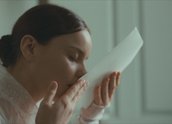


Bright Star (2009)
Synopsis
Hampstead Village, London, 1818. Eighteen-year-old Fanny Brawne (Abbie Cornish) lives in a small house with her sister, Toots (Edie Martin), brother Samuel (Thomas Brodie-Sangster) and widowed mother (Kerry Fox). Through her mother’s connection with the Dilke family, Fanny meets John Keats (Ben Whishaw), an impoverished young poet. Keats is given lodgings by Charles Brown (Paul Schneider), his friend and fellow poet who lives in one half of Wentworth Place, home to the Dilke family.
Despite Brown’s interference, Fanny and Keats form a friendship that develops into passionate yet chaste love. Following the Dilkes’ departure, Fanny and her family move into Wentworth Place. Lacking any financial means, Keats is in no position to marry Fanny. Suffering from tuberculosis, Keats is sent to the warmer climate of Italy by his friends. With Keats tragically separated from Fanny, the two young lovers are only able to imagine and dream of a life together. On 23 February 1821 Keats dies in Rome, aged 25, leaving his letters and poems as a testament to his and Fanny’s love.
Curator’s notes
Taking its title from one of John Keats’ most passionate poems, Bright Star is an elegantly composed chronicle of the great love between Fanny Brawne and the poet who died penniless and virtually unknown in 1821 and is now regarded as one of the great figures of romantic poetry.
An Australia-United Kingdom co-production, Bright Star was the seventh feature film directed by New Zealander Jane Campion and her fourth collaboration with renowned Australian producer Jan Chapman (after Two Friends, 1987; The Piano, 1993; and Holy Smoke, 1999). As with Campion’s feature and TV mini-series An Angel at My Table (1990), Bright Star is centred on an artist whose work was produced under difficult circumstances. Like Ada (Holly Hunter) in The Piano, Fanny is a typically determined, direct and unconventional Jane Campion heroine.
Bright Star is very different from most mainstream period pieces. One of very few films to focus on poets and poetry, it rejects the dramatic flourishes and swelling music that are so frequently employed in costume movies. Instead it opts for a low-key and very realistic depiction of how the relationship between Fanny and Keats would have been conducted in middle-class, early 19th century England. Prior to Fanny and her family moving in to Wentworth Place, meetings between the couple are restricted to formal gatherings governed by strict social protocols of the times.
Theirs is a slow-burn attraction that must first overcome Fanny’s difficulties in understanding poetry (she tells Keats his poems ‘are a strain to work out’) and Keats’ confessed bewilderment with the opposite sex. Another obstacle to Fanny and Keats is Keats’ parlous financial position; despite Fanny’s independent spirit and Keats’ passionate poet’s heart, he is in no position to comfortably support a marriage and family. Their spiritual ‘marriage’ is beautifully expressed in letters exchanged by Keats and Fanny during their frequent separations (see clip three).
Casting and performances are impeccable. Abbie Cornish, who gained notice in the Australian dramas Somersault (2004) and Candy (2006), is outstanding. Whether sparring with Charles Brown, the interfering friend and patron of Keats (see clip one), or falling madly in love with Keats (see clip three), Cornish is faultless in the role that confirmed her status as a major international performer. Ben Whishaw (from Brideshead Revisited, 2008 and Cloud Atlas, 2012) is convincing and very handsome as the fragile Keats, and there are lovely contributions by Kerry Fox (from An Angel at My Table, 1990) as Mrs Brawne and Edie Martin as Toots, Fanny’s utterly charming little sister (see clip two).
Bright Star was released in Australian cinemas on 26 December 2009 and performed strongly at the Australian box office and in overseas markets. It competed for the Palme d’Or at the Cannes Film Festival and was nominated for Best Foreign Film at France’s Cesar Awards in 2010.
Bright Star was nominated for 11 AFI awards: Best Picture, Director and Original Screenplay (Jane Campion), Actress (Abbie Cornish), Supporting Actress (Kerry Fox), Editing (Alexandre de Franceschi), Original Music (Mark Bradshaw) and the AFI Members’ Choice Award. It won the awards for cinematography (Greig Fraser), costume design (Janet Patterson) and production design (Janet Patterson). Patterson, who has worked on four Jane Campion features, also received an Oscar nomination for her costume design.
- Overview
- Curator’s notes
- Video 3 clips
- Principal credits
- Find a copy
- Make a comment
- Map
- Add your review



